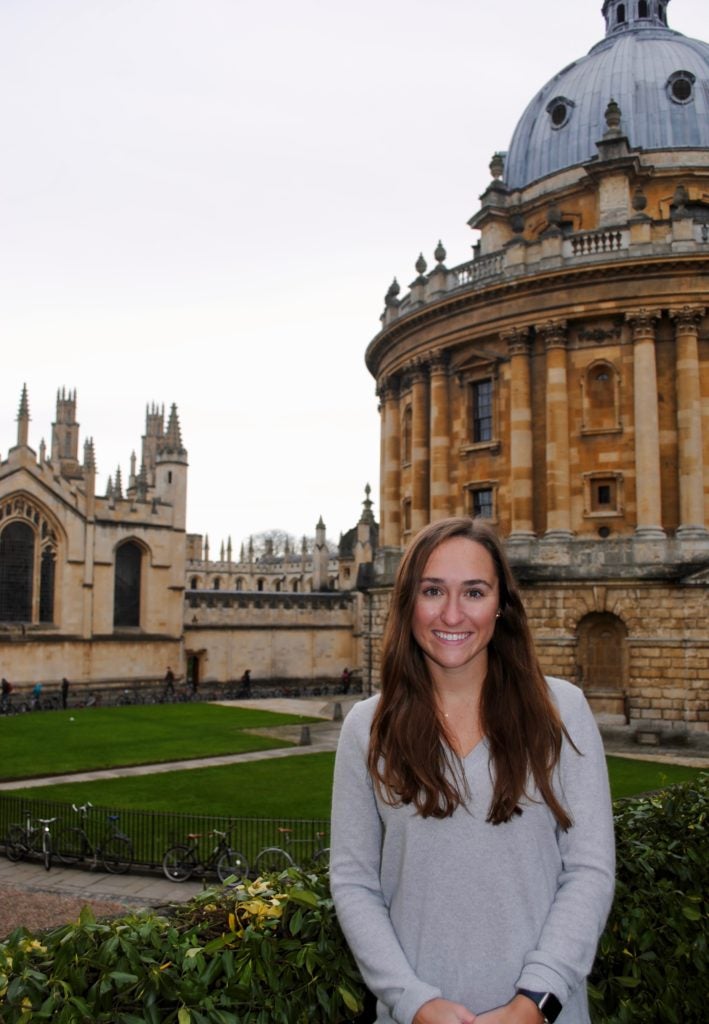Human Science Major Enjoys Yearlong Study Abroad at University of Oxford
January 28, 2020 – During this academic year, Anna Schildmeyer (NHS’21), a junior in the human science major, has been studying at St. Edmund Hall at the University of Oxford in England. She is enjoying the study abroad experience, as well as her Georgetown one, including mentorship, research, and service opportunities.

Question: Where did you grow up, and how did you learn about Georgetown?
Schildmeyer: I grew up in Ohio. I learned about Georgetown from my dad, who traveled to DC weekly for work during my childhood. He brought me and my sisters to see campus while on a college tour of the northeast, and I’ve loved it ever since.
Question: How are you enjoying the human science major?
Schildmeyer: The human science major has been a perfect fit as I’ve been able to combine my interests in medicine, the basic sciences, and public health. Our courses are taught in a way that is relevant to our interest in health, but also encourages us to focus our futures on serving others and committing to Jesuit values like cura personalis. I ended up at a Jesuit university by chance, and it is the Jesuit teachings that have added value to my education.
We are consistently challenged by our professors and encouraged to explore new fields. The human science major fostered in me a new love for research and physiology, and an interest in fields like disability studies and health equity. Dr. Alex Theos’ “Molecular Cell Biology” course gave me the knowledge and preparation I needed to join and be successful in my lab at Nationwide Children’s Hospital this past summer. I credit much of that success to my human science background.
In addition, the NHS is known for its kind, welcoming, and collaborative community. It has provided me with incredible advising, support through the pre-med curriculum, and flexibility in pursuing my interests. I’m humbled by my extremely intelligent and impressive peers, and I can see the many ways in which we benefit from small class sizes and personal relationships with our professors. Thanks to the critical thinking skills and knowledge I’ve gained in the NHS I feel prepared for my future career in the medical field.
Question: Tell us all about your study abroad experience at Oxford.
Schildmeyer: I’ve had an incredible time at Oxford thus far and am so grateful that the human science major allowed me to spend the full year abroad. The University of Oxford is organized in a collegiate system, with each college having a distinct character and providing students with a close-knit, supportive community within the larger university. I am a visiting student in St. Edmund Hall and am studying in the biomedical sciences program.
At Oxford, I take two courses per trimester, allowing for intensive learning with greater depth than in a traditional US course. Academic assessment is through the tutorial system. Each week I submit an essay or problem set and meet with my professor one-on-one to discuss the topics I’ve been studying. This provides an incredible opportunity to learn from an expert in the field while receiving individual feedback. My tutorials for the year include advanced pharmacology, metabolic biochemistry, integrated systems physiology, immunology and microbiology, protein structure and function, and an additional upper-level biochemistry course.
I specifically chose Oxford because of the tutorial system and the opportunities for growth that it provides academically and personally. While tutorials are extremely challenging, they have truly transformed my critical thinking ability, communication skills, and academic writing.
Beyond academics, Oxford is a stunningly beautiful city that is rich with history and provides an energetic city center as well as quiet, idyllic meadows. I’ve loved exploring the intricate, medieval architecture of the colleges. Through the university, I play for the varsity women’s lacrosse team and have had the opportunity to travel throughout the UK and make many new British friends. I’ve also enjoyed volunteering with the senior citizens of Oxfordshire, membership in the St. Edmund Hall Medical Society, and the ability to travel throughout Europe during my 6-week breaks between trimesters.
Each day I’m reminded of how lucky I am to be at this incredible university surrounded by such wonderful people. It truly is the opportunity of a lifetime and I’m very grateful for the intellectual and personal growth this experience has brought me.
Question: What activities are you involved in at Georgetown, and how do you enjoy those?
Schildmeyer: I’ve loved being involved in the NHS community and have had the opportunity to mentor incoming freshmen as a Peer Advisor and am also a “Human Biology” student academic mentor. As a mentor, I teach weekly review sessions to a group of students in the “Human Biology” courses and hold exam workshops with the other mentors. I’ve enjoyed the teaching aspect as a mentor and the opportunities to grow my interest in and knowledge of physiology, and to improve my public speaking and communication skills.
Beyond the NHS, I am a volunteer for the Center for Social Justice’s Hypothermia Outreach Team and a patient care volunteer in the surgical and gastrointestinal in-patient units at Children’s National Medical Center. I also play for the women’s club lacrosse team and am a member of Kappa Kappa Gamma and the Georgetown Pre-Medical Society.
Question: What are you plans for the future?
Schildmeyer: Following graduation, I am planning on taking a gap year before applying to medical school and will likely continue with my research lab at Nationwide Children’s Hospital.
- Tagged
- Hoyas2021
